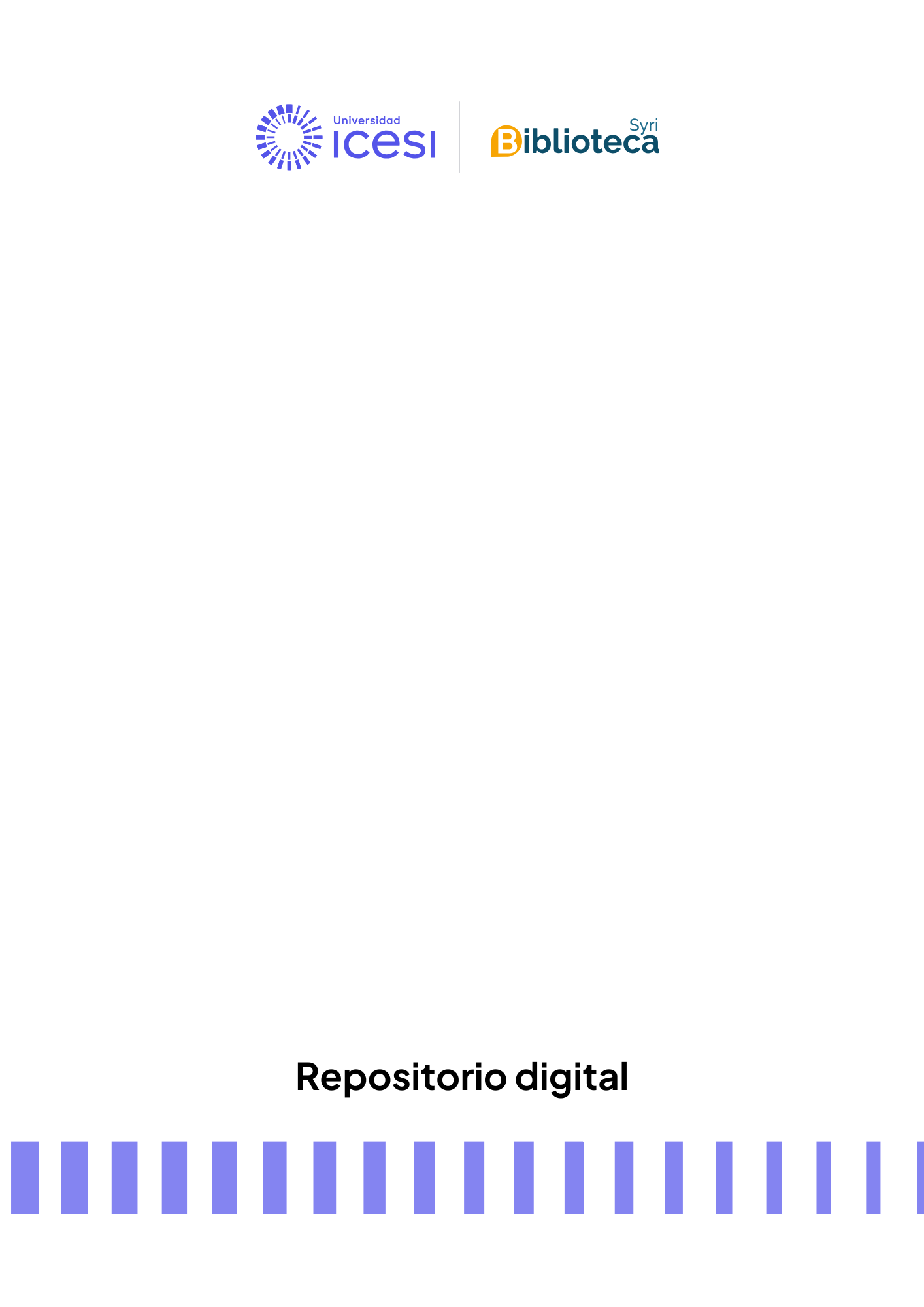Sistemas y Telemática Vol. 7 No. 14
URI permanente para esta colecciónhttp://hdl.handle.net/10906/2130
Examinar
Envíos recientes
Ítem Vol. 7 No. 14, Julio/Diciembre 2009 / Sistemas & Telemática(Universidad Icesi, 2010-03-24T23:32:24Z) Universidad IcesiEsta edición incluye: Guía de implementación HL7 para sistemas de notificación obligatoria en salud pública en Colombia; Acceso al crédito y límites del crecimiento en Pymes: una mirada a través de la dinámica de sistemas; Traspasos verticales: Visión general e innovaciones; Aspectos metodológicos del proceso de adopción del estándar HL7v3 en Colombia: la experiencia del Comité Técnico de Casos de Uso de Laboratorio Clínico; Algoritmos de planificación en redes de paquetes; y Aplicación de herramientas de pensamiento sistémico para el aprendizaje de Lean Manufacturing.Ítem Aplicación de herramientas de pensamiento sistémico para el aprendizaje de Lean Manufacturing(Universidad Icesi, 2010-03-24T23:30:08Z) Rivera Cadavid, Leonardo; Dinas, Johan Armando; Franco Caicedo, PaulaLean Manufacturing seeks to eradicate waste. This pursuit is conducted changing many pre-conceptions inherited from the mass production traditions. It is necessary to understand immediate and delayed impacts of the changes, as well as direct and indirect results of these changes. This systemic approach should enhance the learner’s understanding of the system (the manufacturing company), its variables, its outcomes, and the relationships among the system’s components. This paper presents the process of designing a course to teach Lean Manufacturing to working professionals using systems thinking. This design process is conducted for the development of job competencies and using Active Learning Strategies.Ítem Algoritmos de planificación en redes de paquetes(Universidad Icesi, 2010-03-24T23:27:25Z) Cuéllar Quiñonez, Juan CarlosThis article presents the mechanisms and processes required in order for a router to provide QoS in packet networks and it presents the state of the art in the subject of scheduling algorithms use in this kind of networks.Ítem Aspectos metodológicos del proceso de adopción del estándar HL7v3 en Colombia: la experiencia del Comité Técnico de Casos de Uso de Laboratorio Clínico(Universidad Icesi, 2010-03-24T23:24:57Z) Villegas Machado, Norha Milena; Tamura Morimitsu, Gabriel; Tamura Morimitsu, GabrielThe clinical laboratory orders and results was the first Use Case Technical Committee (UCTC) which began operations in Colombia and the first one in proposing HL7 adapted standards for Colombia. The collaborative work among its members has been the basis for defining implementation guides for the clinical laboratory orders and results use cases. Additionally, as a pioneer UCTC in Colombia, it developed a guide-forguides proposal, i.e. a standard for defining implementation guides in any domain within the CDA scope. This article presents an overview of the evolution of health information systems in Colombia and the first steps that have been taken for the adoption of the HL7 international standard in the country. It also describes the methodology for the development and adaptation of the first HL7 implementation guides.Ítem Traspasos verticales: visión general e innovaciones(Universidad Icesi, 2010-03-24T23:21:22Z) Ríos López, Carlos AndrésIn zones where wireless access networks of various type, coverage, technology and capacity are available, mobility has to deal with the user equipment’s ability to seamlessly switch between different links, even in the middle of an active session. The network has to continuously cope with the selection of a possible new channel for the mobile terminal, and the soundness of this decision has a tremendous impact on the overall performance of the network and quality of service. This survey presents vertical handover related background, research challenges an state-of-the-art proposals in this field.Ítem Acceso al crédito y límites del crecimiento en Pymes: una mirada a través de la dinámica de sistemas(Universidad Icesi, 2010-03-24T23:16:27Z) Arenas Guerrero, Fernando AntonioEl acceso al crédito se considera como uno de los mayores problemas que deben afrontar las Pymes para su supervivencia y crecimiento. Este documento describe un modelo de dinámica de sistemas basado en el caso de una empresa manufacturera de tamaño mediano localizada en Colombia. El modelo integra aspectos operativos y financieros de la empresa e incluye variables asociadas con el crédito comercial y el crédito bancario. Se realizó un análisis de sensibilidad sobre el modelo con el fin de encontrar variables con un alto nivel de apalancamiento sobre los resultados deseados. Dichos resultados indican que las políticas operativas y financieras, cuando se aplican de manera aislada, no son suficientes para resolver los problemas de estancamiento de la empresa. Una combinación apropiada de acceso a crédito, condiciones de crédito, y políticas operativas y financieras adecuadas, parece ser la manera más conveniente para manejar la complejidad inherente a la supervivencia y crecimiento de las Pymes.Ítem Guía de implementación HL7 para sistemas de notificación obligatoria en salud pública en Colombia(Universidad Icesi, 2010-03-24T23:13:28Z) Aguilar Bolaños, Ricardo Adolfo; López Gutiérrez, Diego MauricioIn the field of health information systems there are plenty of examples of legacy systems, designed to meet specific needs of healthcare organizations. Despite the urgent need of collaboration, these systems were not designed to interoperate with other systems. Internationally, the most widely used solution to solve the problem of health information systems interoperability is the design and implementation of standard interfaces, such as those proposed by Health Level 7 (HL7). This article proposes an HL7 Version 3 implementation guide for the interoperability of clinical information systems and public health in Colombia

